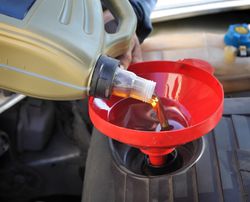How Often Does Your Car Need An Oil Change?

With the various types of oil changes available, it can be daunting and overwhelming when you are searching for the right one to service your vehicle. While you can take your car to the mechanic and ask for their opinion, it is smart to know the basics so that you don't go in blindly. Consult the guide below for an introduction to oil changes.
What Are the Different Types Of Engine Oil?
There are four types of oil you can treat your car with. These include conventional, fully synthetic, blend synthetic, and high-mileage. Conventional oil is the standard option that is commonly used for an oil change. Besides being the most budget-friendly option for your vehicle, conventional oil is best used if your car has low miles. Full-synthetic oil is the ideal product to reach peak performance for your vehicle. It's typically a more expensive option than conventional oil but tends to last longer and allows you to travel further.
Blend synthetic oil offers the best of both worlds. This is the combination of conventional and synthetic oil. While trying to reduce the drawbacks and still provide the same benefits, blend synthetic oil carries higher performance attributes as compared to conventional oil. However, it does not perform as well as full synthetic oil. It's generally better for heavier engine loads and higher engine temperatures, such as SUVs. Lastly, high-mileage oil is designed for vehicles that have 75,000 or more miles on its odometer. Manufactures developed high-mileage oil to reduce oil consumption, protect engine seals, and reduce smoke and emissions to allow the older engines to last longer.
How Does My Driving Impact My Oil?
 Driving on the highway typically gives your engine oil better consistency as compared to start and stop traffic. During start and stop traffic, your engine will not have the same normal operating temperature as it would at a steady speed. If you are a commuter in busy streets rather than the freeway, consider having your oil changed more frequently to maximize the efficiency of your engine.
Driving on the highway typically gives your engine oil better consistency as compared to start and stop traffic. During start and stop traffic, your engine will not have the same normal operating temperature as it would at a steady speed. If you are a commuter in busy streets rather than the freeway, consider having your oil changed more frequently to maximize the efficiency of your engine.
What Are Some Common Mistakes Motorists Make?
Many believe owners who don't use their vehicles often or only drive short distances mean they won't need as many oil changes as compared to everyday drivers. This is a misconception, as you actually might need more frequent oil changes. When you are not using your vehicle, condensed water residing within your car has the potential to degrade your oil. It's best to have your engine run periodically to burn off excess water which can damage your engine and exhaust system.
If you're looking for a dependable auto repair shop, the import auto service and repair specialists at Bennett Motor Werks, LLC in Litchfield, CT, can help. With over 15 years of experience, the family-owned company will have your car back up and running. They provide various repairs, including brake, engine, and AC. Visit their website to learn more about their services or call (860) 567-9290 to speak with a team member today.
About the Business
Have a question? Ask the experts!
Send your question

